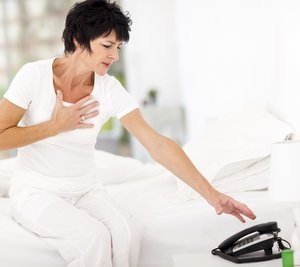
The studies keep coming in confirming the fact that heart attack symptoms in women are often misdiagnosed. The latest study, published in the European Heart Journal Acute Cardiovascular Care, showed that women have a 50 percent higher chance than men of receiving the wrong initial diagnosis following a heart attack.
Getting the initial heart attack diagnosis correct—determining whether a heart attack occurred as well as what type of heart attack it was—shapes both short-term and long-term treatment and ultimately affects survival rates. In this new study, the women who were misdiagnosed had about a 70 percent increased risk of death after 30 days compared to those who received the right diagnosis.
In line with this research, a previous study that appeared in the Journal of the American Medical Association showed that women heart attack patients died at a much higher rate than men—even when in the hospital.
This earlier study analyzed over one million patients on the National Registry of Myocardial Infarction. What they found is that women are more likely than men to go the hospital without chest pain, and to later die in the hospital of a heart attack. So, not only are women themselves missing the symptoms of a heart attack, doctors may be missing the boat as well.
This is clearly a case of women being treated “too little” and “too late.” As the researchers stated, “…patients without chest pain/discomfort tend to present later, are treated less aggressively, and have almost twice the short-term mortality compared with those presenting with more typical symptoms …[of a heart attack].”
What Do You Need to Know About Heart Attack Symptoms in Women?
- Remember that heart attacks in women are normally far subtler than those in men. While men may have crushing chest pain, women often experience much milder symptoms including: chest discomfort, pain, or pressure; back discomfort; pain or tingling in the jaw, elbow, or arm; throat tightness, shortness of breath; indigestion; nausea or vomiting; lightheadedness with exertion, dizziness, or vertigo; disproportionate sweating with activity; and sudden, profound fatigue. Some women can feel like they just have the flu.
- Don’t let your age fool you. In the JAMA study, younger women without chest pain had the highest mortality rate—probably because they were more likely to dismiss the symptoms. This is one case where you want to err on the side of caution and get your symptoms checked out, even if you’re not sure.
- Keep aspirin in your medicine cabinet (and in your purse or wallet), and chew one as soon as heart attack symptoms begin (don’t swallow it whole). Do not substitute ibuprofen, acetaminophen, or another pain reliever. Only aspirin has the anticoagulant clout that may help disintegrate a possible clot. Also take nitroglycerin as directed if it has been prescribed for you.
- Call 911—don’t attempt to drive yourself to the hospital.
- Once you arrive at the hospital, don’t let the hospital staff waylay you with testing for anxiety, stress, or indigestion. Insist that you want a full cardiac workup for your heart attack symptoms.
- Educate yourself about the heart health differences between men and women. You may also want to read my book HeartSense For Women.
Now it’s your turn: Have you ever found that doctors overlook heart attack symptoms in women?


